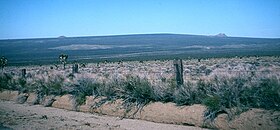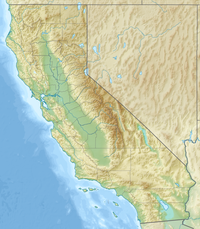Cima Dome & Volcanic Field National Natural Landmark
| Cima Dome | |
|---|---|
 |
|
| Highest point | |
| Elevation | 2,132 to 4,950 feet (650 to 1,509 m) |
| Coordinates | 35°17′22″N 115°35′07″W / 35.2894294°N 115.5852746°WCoordinates: 35°17′22″N 115°35′07″W / 35.2894294°N 115.5852746°W |
| Geography | |
| Location | San Bernardino County, California, U.S. |
| Geology | |
| Age of rock | 80 - 180 million years |
| Mountain type | granitic pluton dome |
| Designated | 1973 |
| Cima Volcanic Range | |
|---|---|
| Highest point | |
| Elevation | 2,132 to 4,950 feet (650 to 1,509 m) |
| Coordinates | 35°15′N 115°45′W / 35.25°N 115.75°W |
| Geography | |
| Location | Mojave Desert, San Bernardino County, California, U.S. |
| Geology | |
| Age of rock | 7.6 million years |
| Mountain type | basalt |
| Last eruption | About 10,000 years ago |
The Cima Dome & Volcanic Field National Natural Landmark, or Cinder Cones National Natural Landmark, includes the Cima Dome, Cima Volcanic Field, and Cima Volcanic Range, and is in the Mojave Desert within San Bernardino County, California, United States.
The dome and volcanic field with cinder cones are located within the National Park Service Mojave National Preserve south of Interstate 15 and Baker, off Kelbaker Road towards Cima, and north of the Kelso Visitors Center and Interstate 40.
Cima Dome is a broad sloping upland dome, the erosional remnant of granite plutons that formed deep under the Earth's surface 180 - 80 million years ago when the Farallon Plate was being subducted beneath the North American Plate.
The Dome rises 1,500 feet (460 m) above the volcanic plain, 2,132 to 4,950 feet (650 to 1,509 m) high, and covers 70-square-mile (180 km2). Cima Dome is an extremely symmetric dome of this granitic formation type, and one of the most visible ones by being in open desert plains.
The Cima Volcanic Field and Cima Volcanic Range includes 40 volcanic cinder cone vents, and extensive basaltic lava flows in a volcanic field covering more than 58 sq mi (150 km2) of the Mojave Desert. It ranges from 2,132 to 4,950 feet (650 to 1,509 m) in elevation. These cinder cones range in size from 82 to 508 ft (25 to 155 m) in height above the volcanic plain and from 656 to 3,018 ft (200 to 920 m) in base diameters. Over 30 of these cinder cones and associated lava flows, are in age and are located in the southern portion of the volcanic field, with the rest from the Quaternary age.
...
Wikipedia


